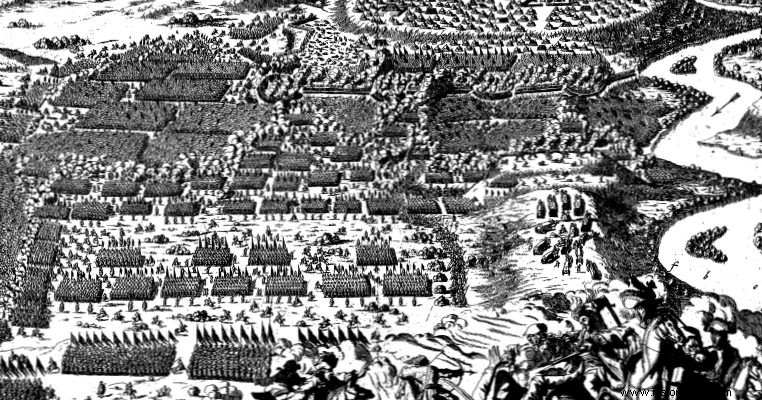
The Battle of Slankamen was fought in 1691 near the village of the same name in Serbia (Vojvodina region) between the Turkish army of Grand Vizier Kioprulu Fazil Mustafa Pasha and a mixed force of Imperials and Serbs under the famous general Louis of Baden, known as "the Louis of the Turks".
After the Turkish defeat at the siege of Vienna in 1683, the Habsburg Empire took the initiative of the movements against the Turks achieving a series of victories in Hungary. In 1688 the Empire ruled Belgrade and in 1689 Bosnia.
However, the French offensive against the Empire forced the Habsburg emperor to turn his attention there. Fatefully, the Turks regained the initiative and conquered many territories, under the leadership of the grand vizier Fazil of the well-known Kioprulu family.
Under his leadership the Turks regained Belgrade and most of the liberated Serbian lands. Because of the danger on the eastern borders, the Empire decided to form a new army against the Turks. He entrusted the administration of this to the elector of the state of Baden, the famous Ludwig Wilhelm of Baden-Baden.
Conflict
After taking command of the imperial army, Louis quickly moved towards Serbia, reaching the confluence of the Danube and the Tiza. Louis had 50,000 men (56 infantry battalions and 116 cavalry regiments, 90 guns).
However, this force was significantly reduced due to the needs of detachments of guards, as well as diseases and fatigue from the short marches. Thus the regular force on the day of the battle reached 33,000 men, of which 23,000 were Germans and the rest Serbs.
On the other hand the grand vizier had 30,000 cavalry, 70,000 infantry and 158 cannons. Louis found himself before the triple Ottoman army on August 17. However, despite their superiority, the Turks did not attack. So Ludovikos decided to retreat to more favorable positions in Schlankamen.
The grand vizier followed the imperials and finally decided to attack on 19 August. The numerous Turkish cavalry charged against the imperials pressing them, at first, seriously. However, the fire discipline and superior training of the Germans began to pay off.
The infantry battalions, closely supported by the light artillery, repulsed the Turkish attacks. Louis patiently waited for the Turks' momentum to wear off, holding his cavalry in reserve. Then about 8,000 Christian horsemen rushed against the Turkish flanks.
The heavy and lighter Turkish cavalry were crushed by the disciplined charge of the Austrian cuirassiers and the rest of the German cavalry and dragoons who had as their vanguard Serbian and Croatian light cavalry. Seeing his cavalry crumbling, Fazil Pasha hastened to lead it personally.
But there he met his death, as a result of which the morale of his men completely collapsed. Great carnage ensued as the Turks ran in panic to escape. A flock of sheep running to escape a pack of wolves, thousands of Turks fell by the swords of the Christians.
When the battle ended, thousands of Turks had filled the plain with their corpses. The losses of the Turkish army in dead, wounded and captured exceeded 25,000 men. Accordingly, the imperial losses in dead and wounded amounted to 8,000 men. The Christians suffered their heaviest losses during the phase of dealing with the first Turkish attack.
The Battle of Schlankamen was an episode in the Great Turkish War (1683 – 1699) that ended with the Treaty of Karlovic with a Christian victory.
